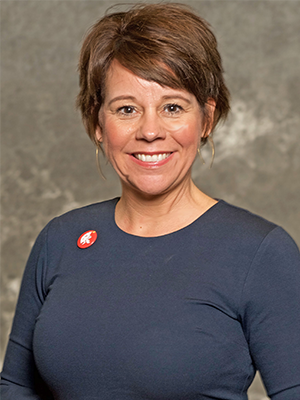#WiMHearHerStory with Kate Rome, President, Rome Grinding Solutions

Kate Rome, President, Rome Grinding Solutions
#WiMHearHerStory | @WomeninMFG

At Women in Manufacturing, we are committed to supporting women in the manufacturing sector. We firmly believe that mentorship and community-building will help attract and retain women in manufacturing. As part of our mission, we feature on our blog the stories of women we admire who are currently working in manufacturing. The following is the latest installment of our "Hear Her Story" series.
Please tell our readers a little bit about your job and what your work looks like every day.
As the president of a privately held equipment manufacturer my role changes day-to-day, and sometimes hour-to-hour. I could be dealing with the accountant, negotiating steel prices, solving employee issues, or filling in almost any role when someone is out. Obviously, my main job is to run a successful company. In recent years, I have focused on implementing many technology upgrades to the manufacturing floor including the addition of 12 CNA machines and a robotic welder that is the first of its kind and was designed specifically to fit our application. And, when we have record rainfall and our building floods, I’m out there pushing water so the production floor can keep running!
How did you arrive at your current position? What attracted you to a career in manufacturing?
I started in my families’ manufacturing company in 1995 at the age of 16. First part-time and then in 1997, I joined the company full-time. I worked alongside my father in various roles including purchasing, accounting, and general management. In 2002, I bought my first piece of the company, and in doing so joined my mother and grandmother to build on the fact that since 1990 the business is majority women owned. In 2008, I was promoted to vice president, and in 2014 became president taking full control of the day-to-day operations. It is important to note that working in my family’s business wasn’t a given or an open door for me. Actually, my dad didn’t want me to work for Rome because we are in a male-dominated industry. He kept trying to fire me, but I wouldn’t leave!
At WiM, much of our work is dedicated to refuting outdated stereotypes about the manufacturing sector: stereotypes like the workplaces are dirty and dangerous and that the field and skills required are a better fit for men. Have you encountered stereotypes like these in your education or career and how did you overcome them?
I sure have, from day one. Actually, some of the stereotypes, at least in our industry, were fairly true. It was a man’s world and, to put it delicately, the ‘shop floor’ was a bit like being in a 1950’s Army barracks. In 1999 – at that time I was the only female working at Rome – I hired another woman. I didn’t want her to work in that kind of environment, so I started a culture change. At times I had to force it, but the shift happened and along with it came improved employee morale. As mentioned in a previous question, in addition to ‘cleaning up’ the atmosphere, I also put a lot of effort into modernizing the manufacturing and distribution processes.
Research shows that women, especially women in STEM fields, do better if they have a mentor. Has mentorship played any role in your career?
My grandmother Delores Boster has been the guiding light for me, both professionally and personally. In 1977, she and my grandfather started Rome in their garage, and she was instrumental in the company’s success. She did everything from coming up with the company name – shortening Rendering and Oil Mill Equipment to Rome - to making sure that everyone working at Rome was treated the same way. She believed that the people who are doing the work are the ones making you successful and in turn she wanted them to succeed. She was a small, but mighty woman, working in a man’s world and her advice still rings true today. “You just have to be a strong person. It doesn’t matter if you are a man or women, just get it done. And don’t take yourself too seriously.”
One of the key findings in WiM’s survey is that there is significant overlap between what young women want in careers and the attributes of careers in manufacturing today. But the survey also found that, too often, young women are not aware of the opportunities available in manufacturing. What do you think can be done to spread the word to women about career options in modern manufacturing?
Aside from what is already being done by WiM and other associations that support women’s careers, each one of us needs to constantly be advocating for the profession. It can be as simple as talking with any girl you know about their career choices to finding opportunities to speak more formally at schools, groups, etc.
Our survey also found that the majority of women in manufacturing today would recommend the sector to young women considering career options. Would you recommend a career in manufacturing? And, if so, why?
Yes, without a doubt. Today, at all levels, from skilled trades to the C-suite women can find rewarding careers. People need to understand that in order to create something tangible through the manufacturing process, we need to use our minds. Companies are always looking to make things better, faster, cheaper, newer, and this takes talent. Women are obtaining higher education degrees at a higher rate than men. Because of this companies need to make a concerted effort to draw more women into the industry.
Why did you decide to join Women in Manufacturing? How do you personally find value in WiM membership?
As a new member I am currently exploring the benefits and have already committed to attending the SUMMIT conference. I hope to find future vendors through the association. I also look forward to learning from this diverse group of women and passing along my experiences to younger members.
To learn more about Rome Grinding Solutions, check out their website here.
